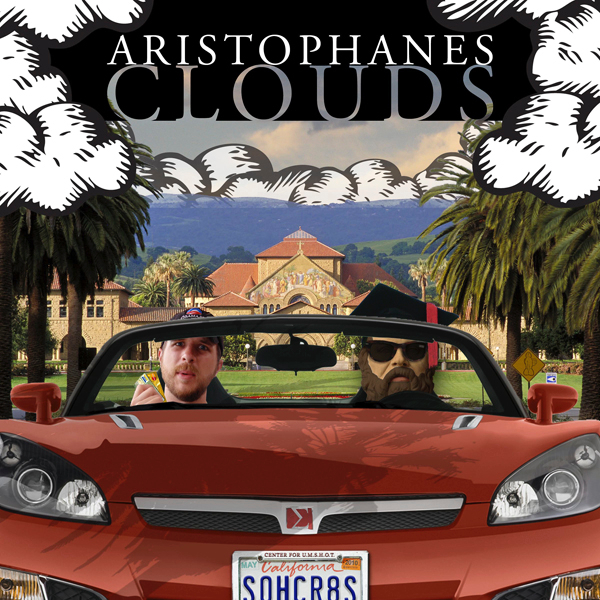
Overview
Synopsis
Strepsiades, an aging Athenian farmer, has been reduced to poverty due to the extravagant tastes of his son, Phidippides. Strepsiades hears of the wonderful new art of argument, the royal road to success in litigation, discovered by the Sophists. He hopes that, if only he can enter the school or ‘Thoughtery’, of the philosopher Socrates, he will learn how to turn the tables on his creditors and avoid paying the debts. He joins the school accordingly, but he is deemed too old and stupid to profit by the lessons. So, he convinces Phidippides to take his place as a more promising pupil. Phidippides takes to the new learning like a duck to water, and soon shows what progress he has made by beating his father and demonstrating that he is justified by all the laws, divine and human, in what he is doing. This opens the old man's eyes, who sets fire to the Thoughtery, and the play ends in a great conflagration of this home of humbug.
One of the first of Aristophanes’ 'Old Comedies,' The Clouds is famous for its satirical presentation of Socrates, and this portrayal is thought to have turned the tide of public opinion on the philosopher which later led to his trial and execution.
Show Information
Context
Plot
Characters
| Name | Part Size | Gender | Vocal Part |
|---|---|---|---|
|
Lead |
Male |
Non-singer |
|
|
Lead |
Male |
Non-singer |
|
|
Lead |
Male |
Non-singer |
|
|
Supporting |
Male |
Non-singer |
|
|
Supporting |
Male |
Non-singer |
|
|
Supporting |
Female |
Non-singer |
|
|
Supporting |
Male |
Non-singer |
|
|
Featured |
Male |
Non-singer |
|
|
Featured |
Male |
Non-singer |
|
|
Ensemble |
Male |
Silent |
Songs
A song with an asterisk (*) before the title indicates a dance number; a character listed in a song with an asterisk (*) by the character's name indicates that the character exclusively serves as a dancer in this song, which is sung by other characters.
Monologues
Scenes
Key Terms
Sorry! We do not currently have terms for this guide.
Videos
Sorry! We do not currently have videos for this guide.
Quizzes
Sorry! We do not currently have quizzes for this guide.
Themes, Symbols & Motifs
Sorry! We do not currently have learning modules for this guide.
Quote Analysis
Sorry! We do not currently have learning modules for this guide.
